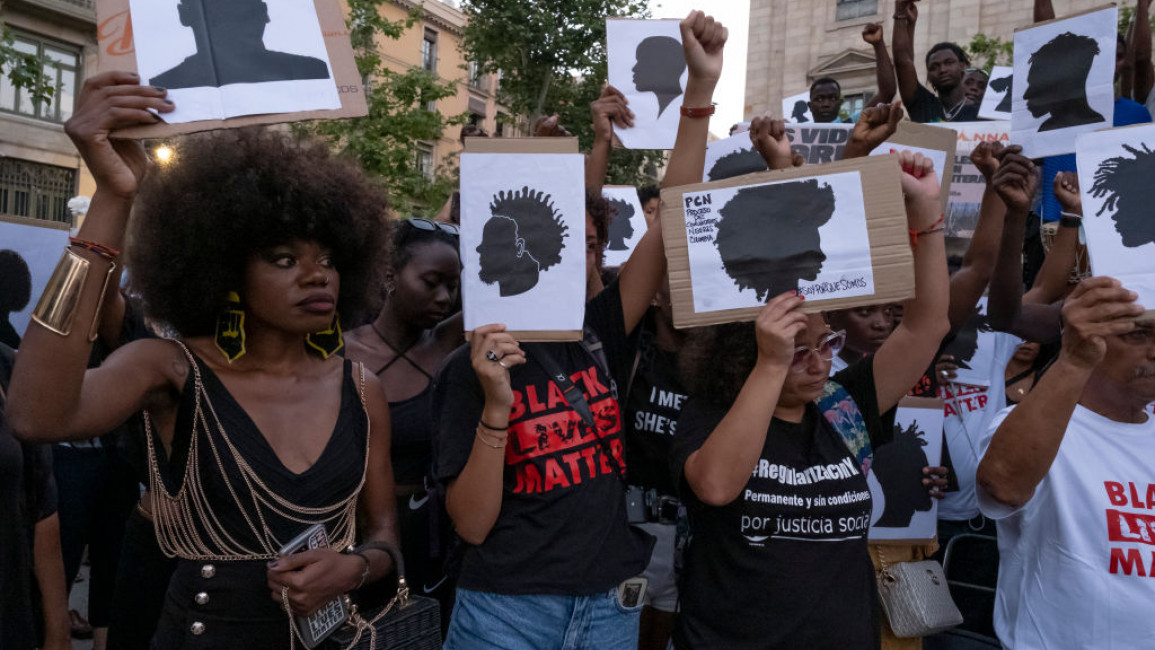'Melilla massacre': US congresswoman Rashida Tlaib condemns 'racist border policy' in Melilla
US congresswoman Rashida Tlaib spoke up on Thursday against the violence Moroccan and Spanish forces used during the "Melilla massacre", calling on the UN and US state department to put an end to "the racist border brutality" on the Moroccan-Spanish borders.
"This is not the first time we've seen horrific news from the Melilla and Ceuta border crossings. The pattern of violence by Spanish and Moroccan authorities against migrants is deeply disturbing," wrote Tlaib on Twitter.
On Friday, June 24, around 2,000 migrants attempted to cross from Morocco's Nador to the Spain-controlled enclave of Melilla, in which Moroccan and Spanish forces killed at least 23 migrants and injured dozens.
Moroccan authorities said 140 of its forces were injured during "the clashes".
Morocco's Association of Human Rights (AMDH) have released footage depicting forces dressed in Moroccan uniforms actively beating cuffed migrants piled up on the ground.
Another video shared by AMDH showed dead migrants and handcuffed still-living heavily injured migrants piled over each other on the ground.
Plus de cadavres et de blessés de migrants subsahariens et soudanais jetés à terre sans aucun secours sur place sous les yeux des autorités qui ne font rien pour les secourir. Alors qu'on pouvait sauver plusieurs vies. pic.twitter.com/EGd3rEQpOi
— AMDH Nador (@NadorAmdh) June 25, 2022
Tlaib has also called on the UN "to stand up and take action to defend the human rights and lives of Black migrants and end this bloodshed."
Last week, the UN said it had received reports of "migrants beaten with batons, kicked, shoved, and attacked with stones by Moroccan officials as they tried to scale the barbed-wire fence."
The UN, AMDH, and tens of Moroccan and international NGOs have condemned the "unjustified" violence used against the asylum seekers and have called for an independent probe into the Friday events.
After an international backlash, Rabat and Madrid said they started an investigation into the incident.
"The state department must use the US' influence at every opportunity to push for justice for victims of this racist border brutality," Tlaib added in a tweet.
The US, which has cosy ties with both Madrid and Rabat, has so far remained silent on the massacre.
The UN needs to stand up and take action to defend the human rights and lives of Black migrants and end this bloodshed, and the @StateDept must use the US' influence at every opportunity to push for justice for victims of this racist border brutality.
— Congresswoman Rashida Tlaib (@RepRashida) July 6, 2022
Rabat's officials have also hidden behind silence, only releasing a few reports referring to "the violence of the migrants" and "the role of human trafficking rings" during the events to Spanish media.
Madrid's officials on the other hand continue to dodge questions about the massacre, asking journalists to direct any questions toward Moroccan officials since it occurred in the Moroccan kingdom's territory
Melilla and Ceuta, two Spain-controlled enclaves that Rabat claims sovereignty over, were a diplomatic battleground between Madrid and Rabat for years.
In 2021, Morocco and Spain slipped into a year-long diplomatic dispute after Madrid hosted Polisario leader, Brahim Ghali, Rabat's leading enemy.
Amidst the diplomatic dispute, about 8,000 migrants, including 2,000 minors, stormed Ceuta borders in an attempt to reach the Spain-controlled enclave.
Crammed boats with men, women, and children crossed the border, while many other migrants were pictured swimming desperately or even paddling across the fences
At the time, Spain accused Morocco of deliberately putting thousands of lives at risk to "blackmail" Madrid during the diplomatic dispute.
The Melilla massacre is the first immigration crisis that has erupted along the Spanish-Moroccan borders since the two countries reconciled this past March under the vow of stronger cooperation on migration.



